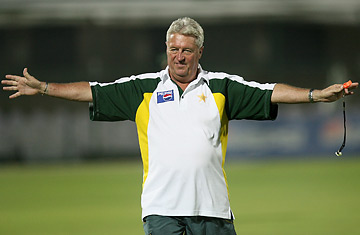
Pakistan cricket coach Bob Woolmer gestures during a training session in 2006.
Initial reports attributed his death to stress over the humiliating result. Perhaps, went the speculation, Woolmer, who played 19 tests for England in the 1970s and '80s and was widely respected as an astute and passionate coach, had taken his own life. Or perhaps the grinding stress of coaching one of cricket's most mercurial teams and dealing with its passionate and insanely demanding fans had finally gotten to him. Woolmer, said former South African bowling great Alan Donald, "gave his life to cricket and probably paid for it."
But there may be more to the story: Jamaica's deputy commissioner of police says the authorities are treating Woolmer's death as suspicious. An autopsy completed on Tuesday was inconclusive, and investigators said they need to wait for final toxicology reports to determine the cause of death. A Pakistani team source told the media that there had been signs of strangulation on Woolmer's body. Indian TV news programs are now speculating that Woolmer intended to expose match-fixing in the game, and that someone — former Pakistani player Sarfraz Nawaz pointed the finger at the subcontinent's betting mafia — wanted Woolmer gone.
What happened in Woolmer's room during the hours between his team's defeat and the discovery of his body remains a mystery that may never be solved. But whether it was caused by stress, suicide or even murder, the tragedy is a brutal reminder that South Asia's wonderful passion for cricket has an ugly and dangerous flipside. Within hours of their team's defeat last weekend, angry fans in Pakistan demanded that the players and their coach be arrested or worse. In India, meanwhile, fans upset that their team had lost to newcomers Bangladesh burned the players in effigy, and trashed the half-built home of young star Mahendra Singh Dhoni — and their team is still in the tournament.
The wrath of the fans is a constant danger on the Indian subcontinent. One deranged cricket lover who believed the Indian team should include more players from his corner of the country recently assaulted national coach Greg Chappell as the Australian legend boarded the team bus. "The expectations are far higher [in the subcontinent]," Chappell told an Indian reporter this week after hearing the news of Woolmer's death. "But in the light of this tragic event, I think we need to take pause and make sure that we don't get too stressed about what is, after all, only a game."
Only a game? Sports fans like to ridicule such phrases."Football is not just a matter of life and death," was how Bill Shankly, legendary coach of the English club Liverpool, once put it. "It's much more important than that." Shankly had a point. Who hasn't mourned their team's loss as if a loved one had died? Who hasn't celebrated a win with an outpouring of jubilation normally reserved for a birth or a marriage? To non-fans, the passion of sports lovers is often unfathomable, because it seems driven by things so trivial.
But real fans understand deep down that their team and its fate are simultaneously both important and meaningless. It's this contradiction that is part of the agony, the ecstasy, the religious-like joy of being a fan. The leap of faith in unison with thousands of others that what you're all watching matters profoundly. Healthy sports lovers care passionately not because they truly think sport is a matter of life and death, but despite the fact they know it's not. When fanaticism starts hurting people, killing them, even, that contradiction vanishes and so does all the joy. It's OK to live for sport, but to die for it is absurd.
